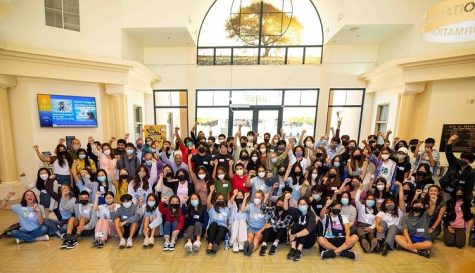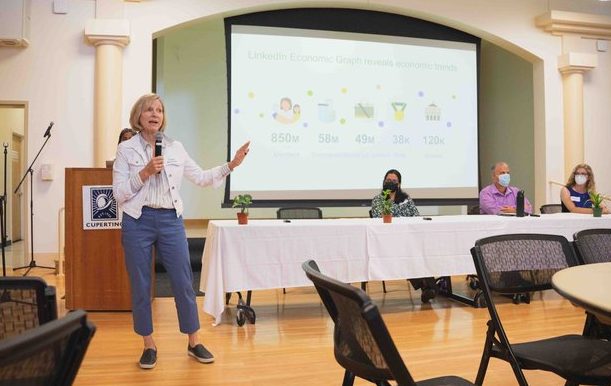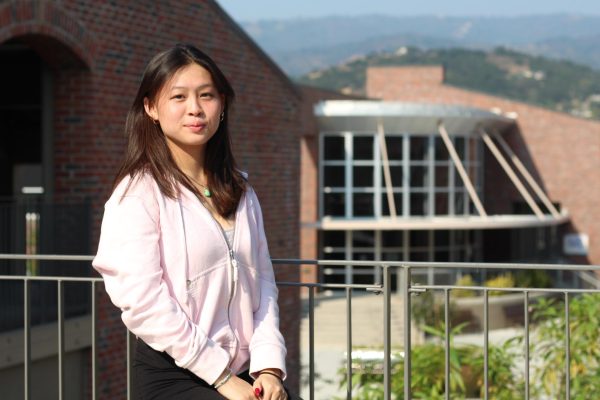Students for change: Silicon Valley Youth Climate Action
Examining an organization that aims to combat climate change
A speaker presents at SVYCA’s 2022 Youth Climate Leadership Summit.
May 30, 2023
Silicon Valley Youth Climate Action (SVYCA) co-founder Hoi Yung Poon vividly remembers the horrific wildfires that painted California’s sky an unnatural shade of red as she discusses the harmful effects of climate change. From wildfires that create toxic air to droughts in various parts of the world, the impact of climate change can be seen on both a local and global scale, which according to Poon, yields extremely detrimental effects on human health.
“[Climate change] is a serious problem, [because] it’s here right now,” Poon said. “It’s not 30 years from now. It’s happening sooner than a lot of people are expecting. At the same time, scientists have been talking about this for decades, but the fossil fuel companies [are] lobbying at every level and they get what they want. So basically, the only way to stop the problem is to ditch fossil fuel, go electric, have a more sustainable lifestyle [and] make important decisions.”
Poon co-founded SVYCA in 2019 in response to Trump’s rise to office, which she saw as a major setback to the advancement of key environmental laws in the United States. After realizing that Silicon Valley didn’t have an easily accessible program for youth interested in climate action, she decided to take action using her 30 years of experience as a nonprofit organization consultant.
“I was literally freaking out,” Poon said. “I [saw] my son and many other youth [become] really stressed about the future in terms of having a livable planet. I felt like people [weren’t] really paying attention to what was going on, and we didn’t have much time left to tackle the problem. [In addition to climate organizations], youth is pretty much the only group who seems to be on top of things, so I just thought I really needed to do something about it.”
Junior and co-lead of the Cupertino branch of SVYCA Elise Chiu became involved in the program after hearing about it through a friend. Chiu’s decision to become an active member within the organization stemmed from her interest in climate policy, which began during her participation in UC Santa Barabara’s Summer Research Academies during her freshman year. From the program, Chiu learned that youth play a crucial role in shaping climate policies and are key players in the fight for climate action.
“[During the program, I didn’t just learn] the science behind [climate change], which I learned in eighth grade, but [also] how policy could shape [climate action],” Chiu said. “The main goal is just advocating and getting youth involved, because the whole idea is that it’s our future and that we have a lot of control over the government. So we’re just trying to make sure that we’re present [at] city council meetings and [that we’re] shaping climate action plans.”
SVYCA Executive Director Rohan Pandit believes that supporting climate champions is a necessary step in shaping future climate plans. Having directly worked with California state Sen. Josh Becker, who Pandit claims is one of the state’s biggest climate advocates in California, Pandit finds it important to have set goals and take measurable steps toward achieving this goal.
“I think the best way to describe it is basically a two-pronged approach,” Pandit said. “[To begin], we train [students], and we do this through recruiting team leaders and advisors [who] teach our kids through workshops, through speaker series [and] through a pretty rigorous training overall to make sure that they understand [the] action plan in order to achieve our climate goals. We want our kids to be educated about these things so that when we get to [the] second prong, we have our kids actually create and maintain relationships with stakeholders in the community. What that means is [they] influence policy [through things such as] attending city council meetings. Because [at the end of the day], if we have a relationship with [the] city council and they listen to us, that’s impactful.”
One major plan that SVYCA worked towards was the Cupertino Climate Action Plan 2.0, which was eventually adopted by Cupertino City Council in 2022. SYVCA supported the plan, which, according to Chiu, pushed for aggressive climate action policies. Plans like these require education, knowledge and detailed organization from youth leaders in the community.
Cupertino High School junior and co-lead of the Cupertino branch of SVYCA Xinpei Liu joined the program as a result of wanting to create a bright future for herself and subsequent generations. After joining SVYCA, Liu found herself growing into a strong leader as she became more aware of the world around her.
“My favorite part is talking to other people in the organization who are also passionate about climate change,” Liu said. “It’s really fun to just exchange ideas and talk about issues and just learn more from each other and just kind of gain experience and wisdom. [Additionally, attending city council meetings with SVYCA] really did help me, because [during] our first public comment, I remember [feeling] really sweaty and being really nervous [and] barely getting a few words out before [I turned] the mic off. But now, even [though] I still get nervous, I can manage to get what I want to say out, [and it] helped me gain a lot of confidence.”
Poon is aware that many students are currently in the same situation as Liu — they are unsure about how to approach the broad subject of climate change. Poon aims to make SVYCA a strong organization that provides students with a learning environment, where they can easily fight for change within their community.

“The approach is [that] the sky’s the limit,” Poon said. “If you want to learn more, [we’ll] absolutely connect you with the right folks. In the process, I think the students learn a lot of things [that correlate with] working in the real world. And then [after] we’ve won so many cases, so many efforts in terms of getting legislation [passed] and whatnot, it [gives students a sense of] confidence and they feel empowered. They feel like [their] voices matter, and [that they] can make an impact, so [they’ll] work and want to do more.”
Overall, Pandit hopes that students will become more educated about climate policies and wants to be able to build skills to help them continue to make an impact beyond high school, such as going into careers that will help solve the climate crisis. At UC San Diego, Pandit completed his undergraduate studies in business and consulting but during his senior year, he realized that “everything is going to be impacted by climate change in the future,” which then caused him to change gears.
“I’m from Cupertino [and I want to spread the idea that] you can still be ambitious [as a result of growing up] in this area, but you could do it for good,” Pandit said. “We want to expose our kids to green career pathways, [whether that happens] through policy [or by becoming] an engineer, an advocate [or] a teacher. There’s a lot of different [paths] we try to expose [students] to [so that they] can still make an impact on climate.”
SVYCA members are continuing to fight for climate action on a local level, which they hope will translate into larger pushes for national and global change. Despite disheartening news about the effects of climate change, Liu hopes that people can remain optimistic in pursuing a greener future.
“I spend all my time thinking about [climate change], and it’s scary,” Poon said. “But I want to end on a positive note, [because] we still have a short time period to turn things around — we [just] need more people to take action.”

















